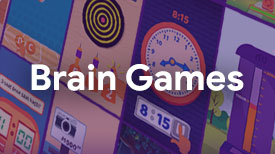How to Boost Your Child's Math Skills - 5 Practical Tips & Tricks
Why Is Maths So Important For Kids & Students?
Learning maths is similar to building a pyramid: you need a good foundation to build the perfect shape. Mathematics is not just about complicated algorithms and calculations. In fact, many people find math problems difficult or complex because they don't receive proper mathematics education during their childhood, and miss out on the opportunity to build a strong base.
A lack of maths knowledge can even affect cognitive development in other areas of life. It’s been proven that children who have a strong mathematics education can make better sense of life and establish cause-and-effect relationships with greater ease.
The fact that these crucial life skills directly increase in proportion to one’s mathematical skills makes it clear that developing math skills in early childhood will have a direct effect on one’s future success.
This means parents have a big role to play when it comes to their child’s mathematical — and future — potential.
How To Improve Child’s Maths Skills
When children don't develop any mathematical skills while they're young, it becomes increasingly difficult to learn advanced concepts later on. Also, parents can observe whether the kid has math learning disability (Dyscalculia) so they can learn how to support the child before school. That's why a student's education begins at home, and even when they start going to school, parents have a huge impact on their after-school activities.
This means parents play a big role in their children's mathematical success.
Here are some tips for parents that will help them support the improvement of their child’s maths skills:
First, understand how children learn
Children need a stimulating learning environment in which they can play and practice new concepts. At this point, they need their parents or teachers to mentor them. Their brains are ready to learn but they need lots of guidance.
TIP: Before creating the best learning environment for your kids, you need to consider what her/his brain hemisphere is more dominant. Here’s a suggested article which you can learn more about: Difference Between Left Brain and Right Brain
Below is an outline of the best learning process for children, divided into three phases.
- Playing and exploring: Children investigate and experience things by engaging with them through play. This is a hands-on process shaped by the child's curiosity. This phase allows children to learn basic knowledge about their environment and develop common sense.
- Active learning: Children actively use their knowledge to build their confidence, seek challenges, and learn how to take risks. This also triggers character development — they can start to view failures as opportunities to learn, not obstacles. Active learning happens through repeated practice, and the best and most fun way for children to practice is to play.
- Creating and thinking critically: When children learn new concepts and actively use what they’ve learned, they begin to absorb this knowledge into their long-term memory. During this phase, they start to use their existing knowledge to think independently and create new links between concepts and ideas, and to build strategies on doing things on their own unique way.
As children consolidate and refine their new knowledge through active learning, their cognitive and maths skills will improve in turn. You can even support your kid’s learning with MentalUP’s scientific and entertaining math games, which were developed by academicians.
As a participant in the University College London Institute of Education EDUCATE Program, MentalUP is one of the most successful brain teasers apps for kids today.
Developing math skills in early childhood
As mentioned before, children start learning maths the moment they start exploring the world. Infants will compare the shapes and sizes of objects, recognise differences in quantities, and use early maths concepts in their daily lives. Maths skills help children develop critical thinking and problem-solving skills, which have a direct effect on their future academic and career success.
Every age group has a key stage where their cognitive development can be supported by parents. Knowing these stages is the key to helping your child build a strong maths foundation.
Development of early math skills over time
| Infants | Distinguish between small groups of objects (1 versus 2) |
| Toddlers | Use number words to label small quantites (such as 1 dog or 2 cats) |
| 2-3 years old | Count objects by touching or pointing to them |
| 3-4 years old | Quickly recognise small groups of objects without counting (such as 1, 2, or 3 balls) |
| 4-5 years old | Begin to add or subtract small quantities (such as adding or subtracking 1 or 2 toys) |
How To Develop Maths Skills In Children
Most children who start school experience difficulty in maths because they did not complete the above-mentioned processes with the right guidance. Falling behind their peers can be stressful for both the child and their parents. But it’s not too late — each child is still able to learn and develop their maths skills.
At this point, it is very important for parents to determine their child's existing level of maths in order to identify the gaps and find the right maths resources for children (e.g math games). Once this is done, their child will be able to keep up in school without losing their motivation or self-confidence.
1- Stay in touch with your kid’s math teacher
Kids spend most of their time at school. This means teachers are a great source of feedback and guidance. You should be open and honest, and talk to your kid’s math teacher so you can cooperate and help your kid overcome their maths problems without any issues.
2- Use technology in a beneficial way
Children love technology. Don’t be the kind of parent that bans technology in the house. Instead, let them test out their curiosity and use technology in a beneficial way. You can encourage them to find cool maths games for children, math problems or math riddles for kids on the internet.
There are even applications developed specifically for this purpose. For example, MentalUP is an app designed to support children's cognitive development with fun kindergarten math games.
3- Turn maths problems for kids into play
Don’t let children memorise the solution to any maths problems. Encourage them to think and use their reasoning skills to find the answers. You can even create stories behind the maths problems to foster deeper engagement with your child — and turn challenging math problems into a creative form of play. This way, you can help them to be more successful in exams and increase their test scores, such as the Math Kangaroo results.
4- Discover the power of the real world maths
As mentioned earlier, math problems is present everywhere in our lives. You can turn real-life experiences into math exercises for kids. When you are shopping, you can discuss prices and amounts, and help your child improve their mathematical thinking. You can bake together to practice numbers, measurements, shapes, and time-keeping. The important thing is to prefer the most suitable math activities for kids.
5- Understand your kid’s uniqueness
Comparing your child with their peers can be very harmful. Every child has their own needs and ways of learning. Don’t panic — instead, try and focus on finding the right way to help your kid. It’s neither your nor your kid’s fault if they need more guidance in certain areas. Don’t be judgemental because your child can be extremely talented in other subjects. Encourage your kid not to only aim for successful grades, but also to be happy, friendly and creative.
To sum up, we can say that children learn the best during play. If children enjoy what they are doing, they will build a deeper understanding of new ideas.
MentalUP is the ultimate scientific brain games app that provides the best maths games for children to play and help you support your child’s focusing, attention, visual, memory, analytical thinking, and all other cognitive skills.
MentalUP first determines the mental skills of your kid through a set of entertaining brain puzzles and then provides them with fun daily challenges to strengthen the weak parts of their brain. You can easily track your child's mental development with the app’s rich reporting modules.
- Childcare Extension: Young Children’s Developing Math Skills (2019). https://childcare.extension.org/young-childrens-developing-math-skills/
- Mathematica, B. Harris. (2017) Developing Math Skills in Early Childhood. Issue Brief: https://files.eric.ed.gov/fulltext/ED587415.pdf






